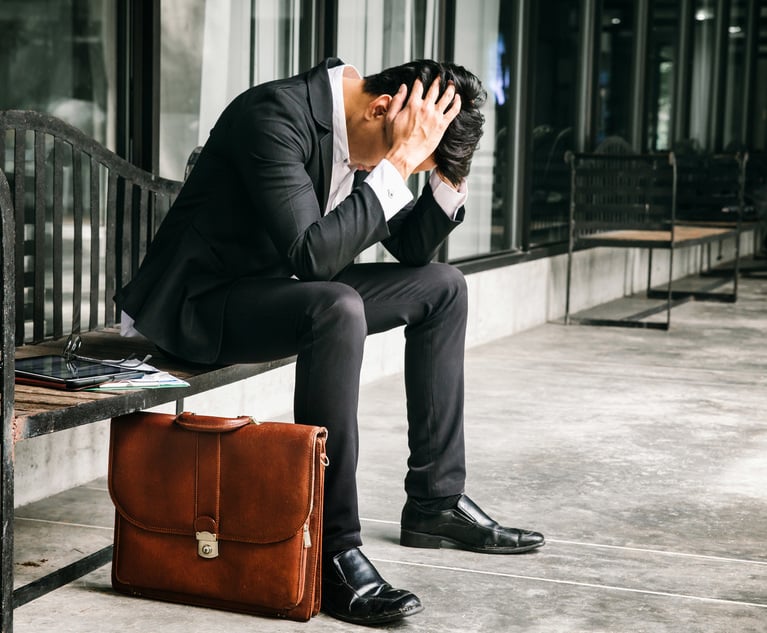 The James A. Byrne Courthouse in Philadelphia. (Photo: Wikipedia)
The James A. Byrne Courthouse in Philadelphia. (Photo: Wikipedia)'What Justice Requires': US Courts in Pa. Fight to Stay Open Amid Coronavirus Outbreak
Attorneys have unanimously said judges have been very accommodating about continuing cases, or handling them through videoconferencing.
March 26, 2020 at 05:16 PM
7 minute read
As the coronavirus began to spread across Pennsylvania, state courts went from being entirely operational to almost completely shut down in the span of a week. Federal courts in Pennsylvania, however, have taken a different tack, opting to remain open despite the outbreak and closing only temporarily whenever courthouse workers report having contracted the sickness.
This approach has gotten praise—as well as some criticism—from the legal community, as courts across the country continue trying to find the right balance between protecting constitutional mandates and protecting public health.
"Everybody who's walking into that building to do their job and defend the Constitution is worried about their own personal health and the health of everybody else," Michael van der Veen of van der Veen, O'Neill, Hartshorn and Levin said. "You do see some gloves in there, and you see some masks, but you also see a community of people normally on different sides coming together and trying to accomplish what justice requires."
State courts in Pennsylvania largely shut down March 20 following an order from the state Supreme Court, which had previously declared a judicial state of emergency across all of Pennsylvania. Federal courts have remained mostly open, although some services have been suspended. For example, the Eastern District of Pennsylvania postponed all jury trials until April 13. Parties have been also allowed to request continuances, or to have their cases handled through telephone or video conferences. But, for the most part, the courthouse doors remain open.
Van der Veen, who does civil and criminal work, said he has been in and out of the federal courthouse in Philadelphia a few times over the past few weeks. He does not plan to head into the courthouse for at least the remainder of the week, however, because on Wednesday, U.S. District Chief Judge Juan Sanchez of the Eastern District of Pennsylvania ordered that the James A. Byrne U.S. Courthouse be closed. The move comes as two attorneys who appeared in the courthouse over the past two weeks have begun showing signs of COVID-19—the disease that results from a coronavirus infection.
Sanchez's order closed the courthouse so it could be cleaned, and said the building is set to reopen for official business starting March 30. The order is similar to orders that have recently shut down federal courthouses in Scranton and Harrisburg.
At the beginning of the week, Middle District Chief Judge Christopher Conner closed the courthouse in Scranton after learning that a person now showing signs of COVID-19 had been in the courthouse March 16. He also said the building is scheduled to reopen March 30 after cleaning.
On March 19, the U.S. Court of Appeals for the Third Circuit also issued a press release, announcing that the Harrisburg facility had been closed after a resident law enforcement officer tested positive for COVID-19. The building had been set to reopen March 24.
The release from the Third Circuit further quoted Third Circuit Chief Judge D. Brooks Smith as saying that, "While all of our judges and court employees recognize the seriousness that attaches to the declaration of a national emergency … the Third Circuit is not in the midst of a judicial emergency."
"The 'current unpleasantness,' as I've recently referred to it, is serious and unprecedented," Smith is quoted in the release as saying. "It tests our collective will … and requires us to be responsive and innovative."
Attorneys have unanimously said judges have been very accommodating about continuing cases, or handling them through videoconferencing. However, some attorneys have expressed concern that the facilities are open and deadlines remain in place. Some have said the decision to continue holding oral arguments in the Third Circuit could pose a health risks to judges. Others have said the decision to keep the federal courts open are in tension with Gov. Tom Wolf's order from March 20 calling for the near complete closure of law offices.
One federal court litigator who handles mostly civil actions and declined to give his name for the article said he has heard concerns, particularly from older attorneys whose law offices are not well equipped to handle videoconferencing, about how lawyers are supposed to manage their cases without being allowed in their offices.
"They don't understand how they're supposed to be meeting all these deadlines when their offices are ordered to be closed," the lawyer said. "Yes, they can access things electronically, but they don't have access to everything."
Many attorneys, however, reported that things have been going smoothly so far, and said that allowing cases to continue to move through the system has its benefits.
Fox Rothschild attorney Peter Buckley said closing down courts creates significant challenges for businesses doing transactional work.
"They essentially can work remotely, but if the courts aren't moving forward and are not having hearings, those businesses stop too," Buckley said.
He added that lawyers have been very courteous and accommodating as well, which, along with the availability of e-filing, means things can continue to operate smoothly without too much court intervention.
"Eventually, there are certain actions in the case that may require judges to get involved, and it seems like the federal courts are doing their best to make the judges as accessible and involved as they can," Buckley said.
Some judges have also been opting to stay outside the courthouse as well.
Eastern District Judge Anita Brody said she has been working remotely for two weeks, handling the full range of judicial duties from her home office. Although she said she's gotten many requests for continuances, in one case she recently handled a sentencing hearing using videoconferencing technology. With no objection from the defendant or prosecutor, she said, she simply rearranged her office a bit for the camera and then put on a robe she usually uses for performing wedding ceremonies. Her deputy, who was in the courtroom, helped live stream the proceeding.
"It was just like I was there," she said.
But, Brody acknowledged that there are some differences.
"I miss the interaction with my law clerks and deputies," she said, adding that the clerk and IT teams have been "excellent" in making sure things run smoothly.
One thing attorneys continue to worry about as courts struggle to balance constitutional mandates and public safety concerns is consistency, or the lack thereof. Klehr Harrison Harvey Branzburg attorney Gaetano Piccirilli, who is based in Philadelphia but has recently been handling cases out of the Southern District of New York, said having a patchwork of different requirements can cause difficulties.
"Most of the concern I've noticed is about having some level of consistency," Piccirilli said. "Lawyers, we thrive on regularity, schedules and predictability."
Still, some feel that, as the number of coronavirus cases continue to raise in Pennsylvania and beyond, it might only be a matter of time before the federal courts see more and more closures.
"The federal courts are trying to hold on to the last tree on the beach as the sand erodes," Piccirilli said. "If you look at the progression of orders from the Eastern District of Pennsylvania, or the Southern District of New York, they're all leading in the same direction that we're probably going to see some disruption."
This content has been archived. It is available through our partners, LexisNexis® and Bloomberg Law.
To view this content, please continue to their sites.
Not a Lexis Subscriber?
Subscribe Now
Not a Bloomberg Law Subscriber?
Subscribe Now
NOT FOR REPRINT
© 2024 ALM Global, LLC, All Rights Reserved. Request academic re-use from www.copyright.com. All other uses, submit a request to [email protected]. For more information visit Asset & Logo Licensing.
You Might Like
View All
GOP Trifecta in Washington Could Put Litigation Finance Industry Under Pressure

Pa. Firms Carve Out Niche in Guiding Lawyers, Funders on Litigation Finance
5 minute read
Big Law Expected To Follow Milbank's Lead With Associate Year-End Bonuses

Many Lawyers Are Reeling From Election Results, but Leaders Are Staying Mum
6 minute readLaw Firms Mentioned
Trending Stories
- 1Judicial Ethics Opinion 24-61
- 2Decision of the Day: School District's Probe Was a 'Sham'; Title IX Administrator Showed Sex-Based Bias
- 3US Magistrate Judge Embry Kidd Confirmed to 11th Circuit
- 4Shaq Signs $11 Million Settlement to Resolve Astrals Investor Claims
- 5McCormick Consolidates Two Tesla Chancery Cases
Who Got The Work
Michael G. Bongiorno, Andrew Scott Dulberg and Elizabeth E. Driscoll from Wilmer Cutler Pickering Hale and Dorr have stepped in to represent Symbotic Inc., an A.I.-enabled technology platform that focuses on increasing supply chain efficiency, and other defendants in a pending shareholder derivative lawsuit. The case, filed Oct. 2 in Massachusetts District Court by the Brown Law Firm on behalf of Stephen Austen, accuses certain officers and directors of misleading investors in regard to Symbotic's potential for margin growth by failing to disclose that the company was not equipped to timely deploy its systems or manage expenses through project delays. The case, assigned to U.S. District Judge Nathaniel M. Gorton, is 1:24-cv-12522, Austen v. Cohen et al.
Who Got The Work
Edmund Polubinski and Marie Killmond of Davis Polk & Wardwell have entered appearances for data platform software development company MongoDB and other defendants in a pending shareholder derivative lawsuit. The action, filed Oct. 7 in New York Southern District Court by the Brown Law Firm, accuses the company's directors and/or officers of falsely expressing confidence in the company’s restructuring of its sales incentive plan and downplaying the severity of decreases in its upfront commitments. The case is 1:24-cv-07594, Roy v. Ittycheria et al.
Who Got The Work
Amy O. Bruchs and Kurt F. Ellison of Michael Best & Friedrich have entered appearances for Epic Systems Corp. in a pending employment discrimination lawsuit. The suit was filed Sept. 7 in Wisconsin Western District Court by Levine Eisberner LLC and Siri & Glimstad on behalf of a project manager who claims that he was wrongfully terminated after applying for a religious exemption to the defendant's COVID-19 vaccine mandate. The case, assigned to U.S. Magistrate Judge Anita Marie Boor, is 3:24-cv-00630, Secker, Nathan v. Epic Systems Corporation.
Who Got The Work
David X. Sullivan, Thomas J. Finn and Gregory A. Hall from McCarter & English have entered appearances for Sunrun Installation Services in a pending civil rights lawsuit. The complaint was filed Sept. 4 in Connecticut District Court by attorney Robert M. Berke on behalf of former employee George Edward Steins, who was arrested and charged with employing an unregistered home improvement salesperson. The complaint alleges that had Sunrun informed the Connecticut Department of Consumer Protection that the plaintiff's employment had ended in 2017 and that he no longer held Sunrun's home improvement contractor license, he would not have been hit with charges, which were dismissed in May 2024. The case, assigned to U.S. District Judge Jeffrey A. Meyer, is 3:24-cv-01423, Steins v. Sunrun, Inc. et al.
Who Got The Work
Greenberg Traurig shareholder Joshua L. Raskin has entered an appearance for boohoo.com UK Ltd. in a pending patent infringement lawsuit. The suit, filed Sept. 3 in Texas Eastern District Court by Rozier Hardt McDonough on behalf of Alto Dynamics, asserts five patents related to an online shopping platform. The case, assigned to U.S. District Judge Rodney Gilstrap, is 2:24-cv-00719, Alto Dynamics, LLC v. boohoo.com UK Limited.
Featured Firms
Law Offices of Gary Martin Hays & Associates, P.C.
(470) 294-1674
Law Offices of Mark E. Salomone
(857) 444-6468
Smith & Hassler
(713) 739-1250





